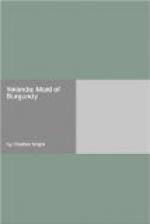The war with Switzerland would probably be short. Max would be with the duke, and would, I hoped, augment the favor with which Charles already honored him. Should Yolanda’s letter make trouble with France, Duke Charles might be induced, through his personal feelings, to listen to Max’s suit. If Charles returned from Switzerland victorious—and no other outcome seemed possible—he would no longer have reason to carry out the marriage treaty with France. It had been made largely for the purpose of keeping Louis quiet while Charles was absent. Anything might happen; everything might happen, while Max was with Charles in Switzerland and Yolanda at home making trouble with France.
The next day, by appointment, we waited on the duke at the morning audience. When we entered the great hall, the urgent business had been transacted, and half a score of lords and gentlemen stood near the dais, discussing some topic with the duke and with one another. We moved near the throne, and I heard Charles say to Campo-Basso and Hymbercourt:—
“Almost three weeks have passed since our message to France, and we have had no answer. What think you, gentlemen, of the delay?”
“His Majesty is not in Paris, or delays answering,” said Hymbercourt.
“By the Host, if I could think that King Louis were holding Byron and delaying an answer, I would change my plans and march on Paris rather than on Switzerland.”
“I fear, my lord,” said Campo-Basso, with a sympathetic desire to make trouble, if possible, “that His Majesty delays an answer while he frames one that shall be elusive, yet conciliatory. King Louis, Your Grace knows, thinks many times before each word he speaks or writes.”
“If he has intentionally delayed this answer, I’ll give him cause to think many times after his words,” said Charles.
Conversations of like nature had occurred on several occasions since the sending of the missive to Louis, and they offered the stormy duke opportunity to vent his boastfulness and spleen. While Charles was pouring out his wrath against his brother-in-law, Byron, the herald, appeared at the door of the great hall. He announced himself, and, when ordered to approach, ran to the dais, kneeled on the second step, and placed a small sealed packet in the duke’s hand.
“Did you find King Louis at Paris?” asked the duke, addressing Byron.
“I did, my lord.”
“Paris is but thirty leagues distant, and you certainly have had sufficient time since leaving us to journey across Europe and back. Did not I command you to make haste?”
“You did, my lord,” answered the herald. “King Louis put me off from day to day, always promising me an answer, but giving it only yesterday afternoon when the sun was half below the horizon.”
Charles nervously broke the seals of the package, and attempted to read the letter. He failed, and handed it to Campo-Basso, saying:—




